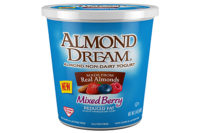The vegan yogurt market is expected to continue its bullish run, driven by a combination of macroeconomic and industry-specific factors. In fact, vegan yogurt's availability in a variety of flavors has helped vegan yogurt sales increase by over 30,000 metric tons in 2018 over 2017, according to analysis by Fact.MR, Rockville, Md.
The study opines that almond yogurt remains the bestseller, accounting for more than half of total vegan yogurt sales in 2018. The trend is expected to prevail, as vegan yogurt companies continue to introduce new almondmilk-based yogurt products.
Households account for 80% consumption of vegan yogurt
Fact.MR finds that over 80% of vegan yogurt is consumed in households. Further, the compact packaging of vegan yogurt allows consumers to eat it on-the-go, making it an attractive snacking option for busy consumers.
The use of vegan products in food chains and restaurants is gradually gaining traction. The study found moderate growth in the utilization of vegan yogurt and products in the foodservice industry. Although households dominate overall consumption, demand for vegan yogurt from households and hotels/restaurants/cafés (HORECA) is growing at comparable rates.
Companies look toward vegan yogurt as mindful choices
Companies in the food processing and production industry are looking to capitalize on the “mindful choices” trend. That’s why many small and large companies are launching new vegan products to consolidate their position. The fierce competition induced in the market as a result of the growing demand for vegan products is expected to lower pricing and encourage innovations in the field.
Furthermore, increasing awareness about the potential side effects of dairy products is inducing a shift towards vegan products. This provides an impetus to the growth of the vegan yogurt market. The opportunities emerging in this sector are not lost on food and beverages companies introducing more vegan products to capitalize on the situation.
Quick and easy ingredient procurement
Vegan yogurts utilize soy, almond, coconut or other plant-based milk for production. These ingredients are easily available, saving processors the volatilities associated with other ingredients. Moreover, the use of plant-based milk for the production of yogurt does not entail the rearing of cattle, which has led to controversies.
The study opines that the Asia Pacific, excluding Japan (APEJ) will remain the largest market for vegan yogurt globally. The APEJ market is likely to reach $3.5 billion in revenues by 2019.





